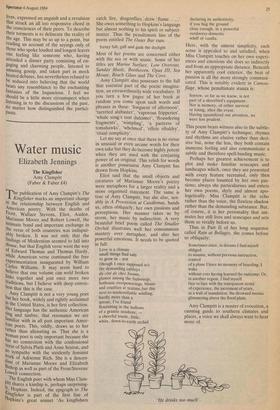Water music
Elizabeth Jennings
The publication of Amy Clampitt's The Kingfisher marks an important change In the relationship between English and American poetry. With the deaths of Frost, Wallace Stevens, Eliot, Auden, Marianne Moore and Robert Lowell, the intimate bond and important exchange in the verse of both countries was indisput- ably broken. It was not only that the findings of Modernism seemed to fall into disuse, but that English verse went the way of Edward Thomas and Thomas Hardy, While American verse continued the free experimentation inaugurated by William Carlos Williams. It may seem hard to believe that one volume can weld broken links together and join once more two traditions, but I believe with deep convic- tion that this is the case.
Amy Clampitt is not a very young poet 13. fit her book, widely and rightly acclaimed in the United States, is her first collection. Her language has the authentic American ling and timbre, that resonance we are familiar with in all past important Amer- ican poets. This, 'oddly, draws us to her rather than alienating us. That she is a ‘v, oman poet is only important because she "as no connection with the confessional verse of Sylvia Plath and Anne Sexton, and no sympathy with the stridently feminist Work of Adrienne Rich. She is a descen- dant of Marianne Moore and Elizabeth Bishop as well as part of the Frost/Stevens/ Lowell connection.
The English poet with whom Miss Clam- Pitt shares a kinship is, perhaps surprising- ly Indeed, the epigraph to The Hopkins's is part of the first line of nLopkins's great sonnet 'As kingfishers
catch fire, dragonflies ; draw flame . . She owes something to Hopkins's language but almost nothing to his spirit or subject- matter. Thus the penultimate line of the poem entitled The Outer Bar runs
frenzy fall, gall and gash the daylight
Most of her poems are concerned either .with the sea or with music. Some of her titles are Marine Surface, Low Overcast, Sunday Music, Beethoven, Opus 1!!, Sea Mouse, Beach Glass and The Cove.
Amy Clampitt also possesses to the full that essential part of the poetic imagina- tion, an extraordinarily wide vocabulary. If you turn a few pages of her book at random you come upon such words and phrases as these: 'longueur of afternoon', 'turreted alabaster', 'vaporous fripperies', 'whale song's taut dulcimer', 'floundering fragments',. 'wimpling', 'a parterre of tomahawks', 'whelmed', 'effete ribaldry', 'ritual complicity'.
Let me say at once that there is no virtue in unusual or even arcane words for their own sake but they do become highly potent when they are used with the conjuring power of an original. This relish for words is another possession Amy Clampitt has drawn from Hopkins.
Eliot said that the small objects and creatures of Marianne Moore's poetry were metaphors for a larger reality and a more organised statement. The same is true of Amy Clampitt, but she also, not- ably in A Procession at Candlemas, hands us, often obliquely, her own passions and perceptions. Her manner takes us by storm, her music by indirection. A very beautiful brief poem called The Smaller Orchid illustrates well her consummate mastery over metaphor, and also her powerful emotions. It needs to be quoted in full:
Love is a climate small things find safe to grow in – not (though I once supposed so) the demanding cattleya
du cote de chez Swann,
glamor among the faubourgs, hothouse overpowerings, blisses and cruelties at teatime,but this next-to-unidentifiable wildling, hardly more than a sprout, I've found flourishing in the hollows of a granite seashore, - a cheerful tousle, little, white, down-to-earth orchid declaring its authenticity, if you hug the ground close enough, in a powerful outdoorsy-domestic whiff of vanilla.
Here, with the utmost simplicity, each sense is appealed to and satisfied; when Miss Clampitt touches on her own experi- ences and emotions she does so indirectly and from an appropriate distance. Beneath her apparently cool exterior, the beat of passion is all the more strongly communi- cated. This is notably evident in Camou- flage, whose penultimate stanza is:
Sorrow, so far as we know, is not part of a shorebird's equipment. Nor is memory, of either survival or losing, after the event.
Having squandered our attention, we were less prudent.
This poem bears witness also to the subtle- ty of Amy Clampitt's technique; rhymes and rhythms are elusive rather than deci- sive but, none the less, they both contain immense feeling and also communicate a subtle and therefore spell-binding music.
Perhaps her greatest achievement is to plot and make familiar seascapes and landscapes which, once they are presented with every feature recreated, only then become places haunted by her own pas- sions; always she particularises and enters her own poems, shyly and almost apo- logetically. Miss Clampitt is the echo rather than the voice, the flawless shadow rather than the demanding substance. But, of course, it is her personality that ani- mates her still lives and seascapes and sets them so vividly before us.
Thus in Part II of her long sequence called Rain at Bellagio, she comes before us obliquely:
Sometimes since, in dreams I find myself obliged to assume, without previous instruction, control of a plane I have no memory of boarding. I wake without ever having learned the outcome. Or, in another region, I find myself face to face with the transparent strata of experience, the increment of years, as a wall of inundation, the drowned mosaic glimmering above the flood plain.
Amy Clampitt is a master of evocation, a cunning guide to southern climates and places, a voice we shall always want to hear more of.
'He drinks too much'






































 Previous page
Previous page